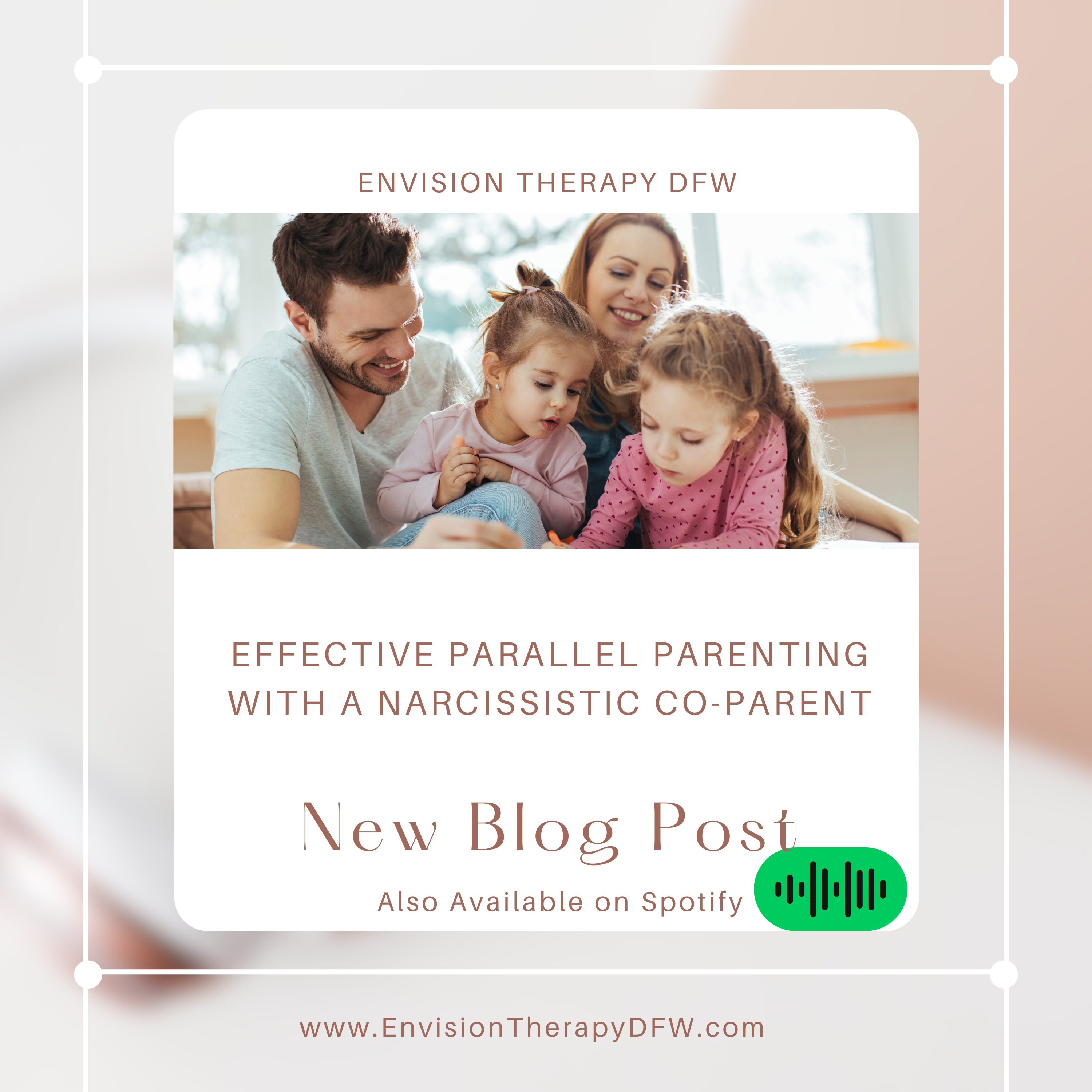Understanding Parallel Parenting
Parallel parenting can be an effective strategy for minimizing conflict and reducing direct interaction with a narcissistic co-parent. This approach is particularly useful when co-parenting with a narcissist, as it allows each parent to manage specific aspects of their child’s life independently, minimizing opportunities for manipulation and conflict.
In parallel parenting, the goal is to prioritize your child’s well-being by creating a stable and consistent environment, even if it means having minimal direct interaction with your co-parent. Here’s how it works:
Dividing Responsibilities
Each parent takes responsibility for different aspects of the child’s life. For example, one parent might handle medical appointments and extracurricular activities, while the other manages school-related tasks and daily routines. This clear division helps minimize conflicts over daily decisions and responsibilities.
Example Situation: Imagine you’re responsible for your child’s medical and extracurricular activities, while your ex-partner handles school-related tasks. This division ensures that both parents are involved in their child’s life but with minimal overlap, reducing opportunities for conflict.
Verbalization Example: “We’ve decided to implement parallel parenting to minimize conflict and create a more stable environment for our child.”
Limited Communication
Communication is kept to a minimum and is typically conducted through written means such as email or a shared parenting app. This reduces the likelihood of heated exchanges and provides a written record of interactions, which can be useful in case of disputes.
Example Situation: You use a shared parenting app to coordinate your child’s schedule and share important information. This helps keep communications focused and reduces misunderstandings.
Verbalization Example: “I find that communicating through email helps us stay organized and reduces conflicts.”
Consistency for the Child
By having clear, separate roles, children benefit from consistency and stability in their routines, which is crucial for their emotional well-being. This approach helps ensure that your child has a structured and predictable environment, regardless of the dynamics between the parents.
Example Situation: Your child knows that on certain days they are with you for specific activities, and on other days they are with your ex-partner for school-related tasks. This consistency helps your child feel secure and supported.
Verbalization Example: “Our child thrives on routine, and parallel parenting allows us to provide that stability despite our differences.”
Focus on the Child’s Needs
The focus remains on the child’s needs rather than the conflicts between the parents. This helps create a more peaceful and supportive environment for the child, as the primary concern is their well-being and development.
Example Situation: Despite your differences with your ex-partner, you both agree to attend your child’s important events separately but supportively, ensuring your child feels valued by both parents.
Verbalization Example: “We both want what’s best for our child, so we attend events separately but ensure they know we both care.”
Establishing Firm Boundaries
Establishing firm boundaries is essential when co-parenting with a narcissist. Clearly define expectations regarding communication, visitation schedules, and decision-making processes. Verbalize your boundaries assertively, using “I” statements to express your needs and expectations without provoking defensiveness.
Example Situation: When discussing parenting decisions, you might say, “I expect respectful communication and a focus on our child’s best interests,” to set the tone for future interactions.
Verbalization Example: “When discussing parenting decisions, I expect respectful communication and a focus on our child’s best interests.”
Prioritizing Self-Care
It’s crucial to prioritize self-care when co-parenting with a narcissist. This means taking time for yourself, seeking support from friends, family, or a therapist, and ensuring that your well-being is not compromised by the stress of the co-parenting relationship.
Example Situation: You schedule regular therapy sessions to process your experiences and develop coping strategies for dealing with your ex-partner.
Verbalization Example: “I make sure to prioritize my mental health by seeing a therapist and taking time for self-care.”
Recognizing and Addressing Manipulation
Being aware of manipulation tactics is essential. Narcissistic co-parents may use guilt, blame, or emotional blackmail to undermine your efforts. Recognize these behaviors and stay firm in your boundaries to protect your emotional well-being and your child’s best interests.
Example Situation: Your ex-partner tries to guilt you into changing the visitation schedule last minute. You recognize this as a manipulation tactic and calmly reinforce the agreed-upon schedule.
Verbalization Example: “I understand you want to change the schedule, but we need to stick to our agreement for our child’s sake.”
Seeking Legal Support
In some cases, seeking legal support might be necessary to ensure that your rights and your child’s best interests are protected. This can include formalizing the parenting plan through the court to ensure compliance and reduce conflict.
Example Situation: You consult with a family lawyer to draft a legally binding parenting plan that outlines each parent’s responsibilities and ensures adherence to the agreed-upon terms.
Verbalization Example: “I’ve consulted with a lawyer to ensure our parenting plan is fair and legally binding.”
Parallel parenting with a narcissistic co-parent requires careful planning, clear boundaries, and a focus on your child’s well-being. By dividing responsibilities, limiting communication, and prioritizing consistency, you can create a stable environment for your child. Remember to prioritize self-care and seek support when needed to navigate this challenging dynamic effectively.
Are you struggling to co-parent with a narcissistic ex-partner? Discover effective parallel parenting strategies by working with Elizabeth to minimize conflict and create a stable, nurturing environment for your child. Learn how to set firm boundaries, communicate effectively, and prioritize your child’s needs. For more tips and support, read our comprehensive guide today!
TLDR:
Parallel parenting with a narcissistic co-parent involves dividing responsibilities, limiting communication, and prioritizing your child’s well-being to minimize conflict and create a stable environment.

